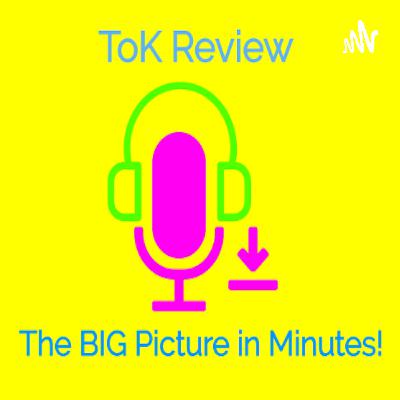Discover ToK Review: The BIG Picture in Minutes
ToK Review: The BIG Picture in Minutes

ToK Review: The BIG Picture in Minutes
Author: Dale Smith, Ph.D.
Subscribed: 1Played: 6Subscribe
Share
© Dale Smith, Ph.D.
Description
This show consists of a series of podcasts reviewing key topics in Theory of Knowledge. The first 3 episodes offer a general introduction to Theory of knowledge (Ways of Knowing, Personal and Shared knowledge, forming Knowledge Questions). The remaining podcasts cover the Areas of Knowledge. Supplementary material is available on the companion site.
I hope these podcasts will help students prepare for topic assessments, and the ToK Essay. Sorry about the ads-the price of free podcasting!
I hope these podcasts will help students prepare for topic assessments, and the ToK Essay. Sorry about the ads-the price of free podcasting!
10 Episodes
Reverse
In this inaugural podcast we confront the limitations of knowledge based on common sense and develop an alternate view based on the metaphor of map-making. It then examines how we determine truth within knowledge systems, followed by an examination of the implications of the first Western knowledge system, Plato's Allegory of the Cave. Supplementary material relevant to this podcast may be found on the companion site
This podcast focuses on our access to the world via the Ways of Knowing and examines 4 WoK's--sense perception, language, memory, and reason. It challenges the assumptions of the unreliability of the ways of knowing, arguing that the WoK's are usually reliable and serve as our primary lifeline to experience. When they prove unreliable, it is due to the conditions imposed by our own physiological constraints, and the argument draws upon research in psychology to examine under what conditions these WoK's are and are not reliable. In each WoK, the manner in which it influences knowledge is investigated.Supplementary material relevant to this podcast may be found on the companion site
This final introductory podcast explores the two different types of knowledge investigated in ToK, personal knowledge and shared knowledge, as well as the relationship between the two. The use of knowledge question to investigate these types of knowledge is also explained. Supplementary material relevant to this podcast may be found on the companion site
This overview of Ethics begins with a discussion of the scope of ethics and next examines the types of moral choices available. Next, the levels of moral choices are examined, as well as the moral systems used by each. The remainder of the podcast focuses on the two areas most relevant to ToK, normative and applied ethics. Supplementary material relevant to this podcast may be found on the companion site
The podcast distinguishes science from psuedo-science, and then lays out the tradtional view of the scientific method. The remainder of the podcast deconstruct this view, using the work of Kemeny, Bronowski, Popper, and Kuhn to offer a more sophisticated view of the scientific method.Supplementary material relevant to this podcast may be found on the companion site
The podcast examines the scope of the human sciences, contrasting them to other Areas of Knowledge. It attempts to deconstruct the traditional theory of the human sciences, and lays the groundwork for a more sophisticated understanding of how the human sciences operate. This new understanding is the applied to two very different types of investigation in the human sciences, those of economics and psychology.Supplementary material relevant to this podcast may be found on the companion site
This podcasts considers the subject matter of the arts, and its contributions to knowledge The ways of knowing and the issue of how the arts produce knowledge is reviewed. We will consider how we evaluate art, and ask to what degree is there a "method" to the arts? Finally the podcast will examine four interrelated methods for developing informed opinion within the arts. The show concludes with an examination of to what degree we may develop standards for shared knowledge in the arts. Supplementary material relevant to this podcast may be found on the companion site
Our review of mathematics begins with a consideration of the scope of mathematics, and compares mathematics to other areas of knowledge. The question of whether math is real or discovered is considered, and the curious relation of abstract thought and its persistent relevance to the natural world is examined. The structure of mathematical knowledge is explored, using John Kemeny's A Philosopher Looks at Science as our guide. The ways of knowing are detailed, and the podcast concludes with an historic overview of the mathematical quest for certainty. Supplementary material relevant to this podcast may be found on the companion site
We begin the podcast by considering the nature of God, and to what degree proofs for the existence of God or Gods are a productive approach to understanding religion. After examining the limitations of this approach, the podcast investigates two alternate approaches, evidentialism and pluralism, and again the strengths and limitations of each approach is evaluated. From this discussion a set of criterion for evaluating religious claims is developed. This is incorporated in the third approach, that of reformed epistemology. Finally the nature of religious truth is examined. (Part of the podcast was recorded during a rainstorm, providing an unintended background track.) companion site
We begin the podcast by considering the scope of history and the unique set of issues that it involves. Next, historical research methods are investigated in order to determine what type of truth history yields. This is done in part by comparing it to other areas of knowledge. The primary tools of history (selectivity, simultaneity, and scale) are discussed. We consider the implications of these approaches., drawing again upon the metaphor of cartography. Next, the podcast reviews how we evaluate historical claims by examining historical systems of knowledge—directional, cyclical, linear, great man theories, topic-focused theories, and the history of ideas approach. In contrast to these, the challenge postmodernism presents historical analysis will be discussed. All of this is designed to provide a more accurate and balanced view of history and the knowledge that it produces. companion site








